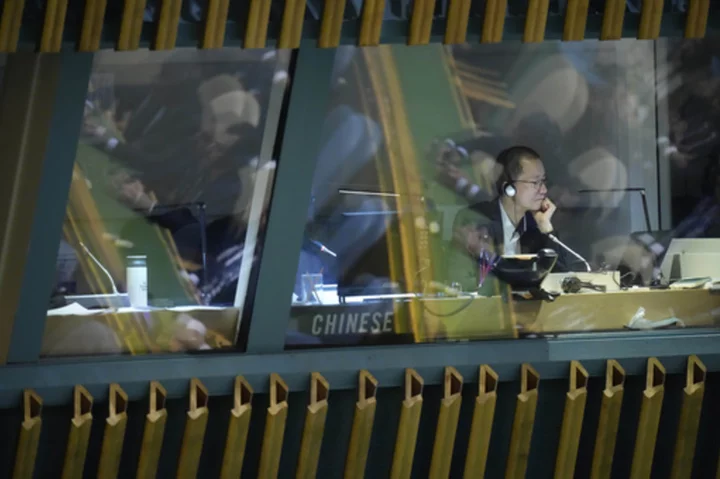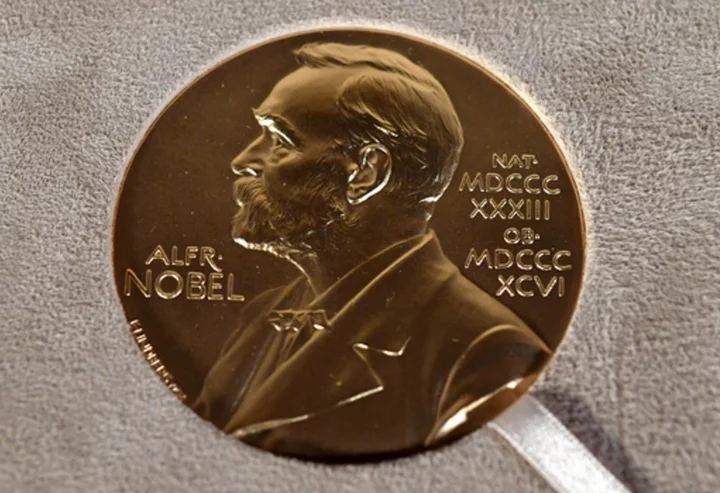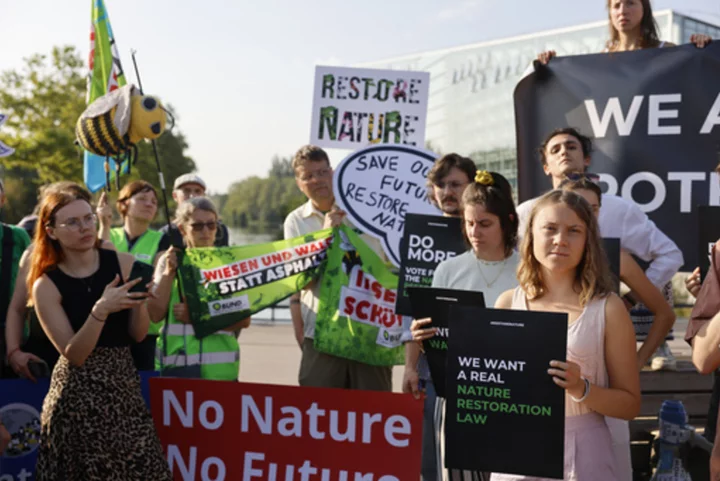UNITED NATIONS (AP) — Nearly all the world's on stage, and all the men and but 20 women merely players. That's what a less-inspired Shakespeare might have written about this year's U.N. General Assembly meeting of leaders, which concluded Tuesday.
Over six days, a cavalcade of world leaders addressed the U.N. General Assembly against a literal backdrop of marbled green and a more figurative one of diplomatic rows, reignited tensions and a litany of world crises.
Now, the speeches have been spoken, the right of reply has been duly exercised, and the world's stage — or at least its spotlight — has been effectively dismantled until next year, although the work of the United Nations continues year-round.
There were too many things happening to count at the United Nations this past week. Nevertheless, we tried.
UN GENERAL ASSEMBLY SESSIONS: 78September marks the opening of the 78th session, presided over by Dennis Francis of Trinidad and Tobago. Each session runs for a year.
DAYS OF GENERAL DEBATE: 6As in recent years, the General Debate stretched over six days — but ended a day later than usual. Running from Tuesday, Sept. 19, through Tuesday, Sept. 26, the speeches paused for Sunday — as is typical — and Monday, to mark Yom Kippur.
SPEAKERS: 194This count includes U.N. Secretary-General António Guterres, who opened proceedings, and Francis, who gave opening and closing speeches (he is only counted once). It also includes the three permanent observers — Palestine, the Holy See and the European Union — who are invited to address the General Assembly alongside the 193 U.N. member states.
But wait, you might ask after some basic math, shouldn't there be 198 speakers? Who was missing?
ABSENCES: 4Afghanistan, Myanmar, Niger and Madagascar were each absent from the rostrum. This is the third year in a row where Afghanistan and Myanmar have been silent, following the respective takeovers by the Taliban and military junta, and subsequent credentialing dispute. Niger underwent a coup this year, too, and its junta accused Guterres of trying to appease France and its allies by denying its preferred envoy the chance to speak.
As for Madagascar, its absence is less clear, especially after the country's foreign minister met with Guterres on Monday. A spokesperson for the president of the General Assembly told The Associated Press that Madagascar — which was on a provisional list of speakers — chose not to speak, but that no reason was given. An email address and phone numbers listed for Madagascar’s mission to the U.N. were not operational and the AP could not immediately reach the government for additional comment.
FIRST SPEECH: Brazil LAST SPEECH: MoroccoBrazil spoke first, per tradition. Morocco spoke last, which is not per tradition (last year, that spot went to Nauru). The order of speakers is generally determined by who a country sends, their preference and availability and geography. Which brings us to...
TYPE OF SPEAKERSPresidents: 85
Prime ministers: 41
Kings: 2
Princes: 2
Emirs: 1
Ministers, of some sort: 47
Vice presidents: 6
Transitional or interim leaders: 2
Permanent representatives: 6
There were more presidents in New York this year than last, but fewer prime ministers. Overall, the United Nations touted attendance as a return to form after the coronavirus pandemic. At a briefing Tuesday, the U.N. revealed it issued General Assembly passes to more than 10,800 delegates (up from 6,755 last year) and 2,255 media representatives (up from 1,141). It also issued more than three times the number of special event tickets this year, at about 40,000 (compared to 12,000 last year).
“I think it showed that this is a place where we all have to come to discuss these global issues,” said Guterres' spokesperson, Stéphane Dujarric.
The tally of speakers delineates the heads of government, heads of state, ministers and other representatives who spoke. Five royals took the rostrum — the kings of Jordan and Eswatini, the emir of Qatar, the prince of Monaco and a prince of Saudi Arabia, who is also that country's foreign minister (the list above only counts him in the prince column).
Archbishop Paul Richard Gallagher, the Holy See's secretary of relations with states, functions as the Vatican's foreign minister and is counted in the ministerial tally.
Gen. Abdel-Fattah Burhan is Sudan’s transitional leader, and returned to the rostrum for the second year. Speaking for Pakistan was its caretaker prime minister, Anwaar-ul-Haq Kakar, ahead of planned elections early next year.
GENDER OF SPEAKERSMale: 174
Female: 21
The number of women speaking at the General Assembly has historically been few: in 2021, it was 18, last year, 22. The lack of women's representation was noted by several speakers, including South African President Cyril Ramaphosa.
“Where are the women of the world?” he asked on the first day of the General Debate.
Only 10 of the women who spoke were actually heads of state or government.
In his speech at the opening of the second-ever Platform of Women Leaders, Francis noted that the U.N. has never had a female secretary-general (something Gloria Steinem told the AP last week she wants to change) and only four women have served as president of the General Assembly.
LANGUAGES USED TO DELIVER SPEECHES: 23English: 107
French: 21
Spanish: 20
Arabic: 18
Portuguese: 8
Korean: 2
Russian: 2
While some speeches featured sprinklings of another language (or in Luxembourg and Canada's case, a healthy heaping of French), we counted based on the bulk of the speech.
Once again, the only official U.N. language in which just one speech was delivered was Chinese. The other languages deployed just once: Bengali, Catalan, Croatian, Farsi, Finnish, German, Italian, Japanese, Kyrgyz, Macedonian, Mongolian, Tajik, Turkish, Uzbek, Vietnamese. The U.N. has a language unto itself, slipped into many an address.
AVERAGE LENGTH OF SPEECHES: Around 19 minutesWhile the first day of speeches was notably long — nearly every speech that day flagrantly fouled the strongly recommended 15-minute time limit — it eventually evened out on track with last year's average. If you were inclined to watch every speech, back to back, it would take about 3,728 minutes — or 2 1/2 days.
SHORTEST SPEECH: Libya, at about 7 minutes and 10 secondsFathallah al-Zani, Libya’s youth minister and temporary foreign minister, told the U.N. his country was “weighed down with sadness” after devastating floods killed thousands. Libya has a divided government; al-Zani belongs to the Tripoli government, in the west.
LONGEST SPEECH: Burkina Faso, at about 37 minutes and 46 secondsBassolma Bazie, Burkina Faso's minister of state, delivered a polemic that, among other topics, addressed conflict in the Sahel, discussed imperialism and trade and condemned homosexuality.
EXERCISES OF THE RIGHT OF REPLY: 23After speeches close for the day, countries can choose to exercise their right of reply — a rebuttal, in essence. While its timebound and still stately — there's no interrupting the largely pre-written statements usually delivered by a low-level diplomat — it's still generally the spiciest the General Debate gets.
This year, Japan exercised it thrice, the most of all countries. Its statements rebutted concerns over the discharge of radioactive wastewater. Algeria and Morocco traded heated statements over regional matters twice each, as did Azerbaijan and Armenia over Nagorno-Karabakh. Guatemala and Iran also used their right twice, though not at each other. India, Pakistan, South Korea, North Korea, China, Guyana, Belize, and the United Arab Emirates.
___
Associated Press journalists Chinedu Asadu in Abuja, Nigeria, Jennifer Peltz at the United Nations and Derek Gatopoulos in Athens, Greece, contributed reporting.









